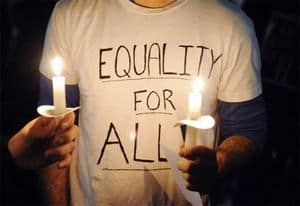 Last night, we re-elected Barack Obama as President of the United States. He is the first sitting president to be a true, unflinching, and fierce ally of our community: he supported our service members' right to serve openly, our right to sit by our ailing loved ones in the hospital, our right to the same federal benefits opposite-sex marriage couples get, our right to be free from workplace harassment and discrimination, and, of course, our freedom to marry.
Last night, we re-elected Barack Obama as President of the United States. He is the first sitting president to be a true, unflinching, and fierce ally of our community: he supported our service members' right to serve openly, our right to sit by our ailing loved ones in the hospital, our right to the same federal benefits opposite-sex marriage couples get, our right to be free from workplace harassment and discrimination, and, of course, our freedom to marry.
And, the freedom to marry did pretty well last night, too. In Maine, marriage won at the ballot. In Maryland and Washington, voters retained the legislatively passed civil marriage laws. That means that Mainers, Marylanders, and Washingtonians can get married (as soon as their respective laws take effect). Minnesotans rejected a marriage discrimination amendment.
And, that's not all. Wisconsin will send Tammy Baldwin to the Senate. She will be the upper chamber's first openly gay member. Upstate New York will send our friend Sean Patrick Maloney to the House of Representatives. Rhode Island's David Cicilline and Colorado's Jared Polis, two other openly gay congressmen, will also bo going back to Washington. California is likely to send Mark Takano to Washington as its first openly gay person of color representative. And, Kyrsten Sinema may eke out a victory in Arizona and become Congress's first openly bisexual member.
Our strongest allies also won big yesterday. New York Senator Kirsten Gillibrand, perhaps the Senate's strongest LGBT ally, trounced her opponent to win a full term in her own right. Maine elected the Independent Angus King, who has long been a supporter of gay rights. Tim Kaine, a freedom to marry supporter, is the newest U.S. Senator from Virginia. My former bankruptcy law professor, Elizabeth Warren, a vigorous LGBT ally in every respect, replaces Republican Scott Brown in the Senate, as well. Chris Murphy made a fool of Linda McMahon, who spent over 90 million of her own money to lose two senate elections in Connecticut.
Maggie Hassan won the governorship of New Hampshire and will stand as a firewall against a Tea Party legislature that has threatened to overturn that state's civil marriage law. And, my college classmate and friend, Chris Pappas, will serve alongside Governor-Elect Hassan as a member of the NH Executive Council.
In addition to these new faces — the next Congress will have many! — yesterday's election will send back to office many allies who have been strong supporters of LGBT rights for years, including but not limited to the lovely Amy Klobuchar of Minnesota, the liberal lion Bernie Sanders of Vermont, the fiesty and messy-haired Sherrod Brown of Ohio, and hundreds of Democratic congresspersons. Also, a special note has to go to 2012's winner of Survivor: Politics, Claire McCaskill of Missouri, who not only helped orchestrate the nomination of her exceedingly conservative opponent, Todd Akin, but pounced on his "legitimate rape" comments at the right time and in the right tone to win a second term in the Senate.
Our allies also won or padded their majorities in state legislatures in Minnesota, Delaware, Illinois, Colorado, and Hawaii.
Those are the facts. Now, what does it all mean for our community?
 As a practical matter, it means that the freedom to marry is poised to have a 2013 and 2014 even better than its 2012. This election season will be the tipping point for the freedom to marry and other gay rights issues for two broader reasons: the silencing of our opponents' last argument and the effect of the trend on other states and the courts. This has implications for state ballot initiatives or legislative action coming up in 2013 and 2014, but also for constitutional questions surrounding the Defense of Marriage Act and heightened scrutiny.
As a practical matter, it means that the freedom to marry is poised to have a 2013 and 2014 even better than its 2012. This election season will be the tipping point for the freedom to marry and other gay rights issues for two broader reasons: the silencing of our opponents' last argument and the effect of the trend on other states and the courts. This has implications for state ballot initiatives or legislative action coming up in 2013 and 2014, but also for constitutional questions surrounding the Defense of Marriage Act and heightened scrutiny.
Second, and related, our victories and our allies' victories evidence the rise of Our America, not a new America, but one that represents who we are and want we want the world to look like. It is an America that is younger, more diverse, and less concerned with dividing us up by religions, genders, and sexual orientations. It is an America that embraces identity, not hides it, which itself has two implications. First, openly gay candidates win when they bring their identity as gay persons to the concerns of a broad constituency, which may help explain why Sean Maloney won, but Richard Tisei did not. And, second, the talking points governing the Log Cabin Republicans and GOProud minimizing the role played by their gay identity — "gay is only a small part of who I am" — does not resonate with anyone in Our America.
Starting today, and in the coming days and weeks, I will address these lessons. I will also discuss a few non-LGBT-specific lessons of yesterday's election, including the next steps for the Republican Party, the curious case of polling, the nonexistent enthusiasm gap, and the stubbornly Republican House of Representatives. Stay with me AFTER THE JUMP as we discuss state legislative victories and the next steps for the freedom to marry. There is a lot to talk about!
CONTINUED, AFTER THE JUMP…
We talk a lot about the Defense of Marriage Act cases and the federal challenge to California's Prop 8. On behalf of the freedom to marry, we are waging a federal fight in the courts. But, as we argue in the DOMA cases, marriage is a state issue, so winning the right to marry will only come if we organize on the state level, galvanize voters, elect our allies, and spend money where it can do the most good.
Marriage freedom was possible in Maryland and Washington because Democrats overwhelmingly controlled the legislative branches and held the governors offices. Chris Christie's presence in New Jersey stopped us from having another state on our side and although we owe New York Senate Republicans thanks for voting their consciences and not their party, we only won the freedom to marry in New York because of a Democratic Assembly, overwhelming Democratic support in the Senate, and a strong Democratic governor in Andrew Cuomo.
 That is why the state legislative victories in Minnesota, Delaware, Illinois, Colorado, and Hawaii are my sleeper picks in a night full of bright stars and amazing victories. In Minnesota, where Republicans took the legislature in the Tea Party eruption of 2010, Democrats regained control yesterday and will control all levers of political power in the Twin Cities for the first time in 22 years. In Delaware, Democrats control every state-wide office and held the legislature. The First State's governor, Jack Markell, is a vocal marriage freedom supporter and a really nice guy, too! Illinois is blue through and through. In Colorado, where we had trouble getting a civil union bill passed in the last session, Democrats took control of both the state senate and house. Governor John Hickenlooper has voiced some support for the freedom to marry, as well. And, in deep blue Hawaii, there is only one Republican in the state senate. Democrats also control a super majority in the House.
That is why the state legislative victories in Minnesota, Delaware, Illinois, Colorado, and Hawaii are my sleeper picks in a night full of bright stars and amazing victories. In Minnesota, where Republicans took the legislature in the Tea Party eruption of 2010, Democrats regained control yesterday and will control all levers of political power in the Twin Cities for the first time in 22 years. In Delaware, Democrats control every state-wide office and held the legislature. The First State's governor, Jack Markell, is a vocal marriage freedom supporter and a really nice guy, too! Illinois is blue through and through. In Colorado, where we had trouble getting a civil union bill passed in the last session, Democrats took control of both the state senate and house. Governor John Hickenlooper has voiced some support for the freedom to marry, as well. And, in deep blue Hawaii, there is only one Republican in the state senate. Democrats also control a super majority in the House.
This sets up our efforts nicely. After taking a much deserved night off, the leadership at Freedom to Marry will likely take a look at the state legislative map. They will see that California will soon join the ranks of the enlightened because the American Foundation for Equal Rights did its job. And, they will see windows of opportunity in, at a minimum, Hawaii — where Governor Neil Abercrombie has already said that civil unions are not enough; Illinois — where Governor Pat Quinn and the state legislative leadership have all come out in favor of marriage; and, Delaware — where Governor Markell can bring in the always amazing Vice President (and former Delaware Senator) Joe Biden to preach to an electorate already on our side. In Colorado, civil unions may be a more likely first step. There is also Oregon, which may have said no to recreational use of marijuana, but is still a progressive stronghold like its neighbor to the north.
Needless to say, 2013 gives us options and it may give us another unprecedented series of marriage victories.
This is important for several reasons.
First, it would allow thousands more committed and loving gay couples to marry. Never forget that.
Second, it deprives our opponents of their last talking point — namely, that every time the freedom to marry is put up for a vote, it loses. The "people," they say, don't want it. No one can say that anymore, and when four more states join the family in the next few years, the old canard will sound funny, antiquated, and pathetic.
Third, every additional state that approves of the freedom to marry makes it easier to win a federal constitutional right to marry. Federal courts are supposed to be insulated from political whims, which is why we appoint our federal judges to life tenure. But, there is no doubt that politics can move law. A voice no less prescient and insightful than former Justice Sandra Day O'Connor said, "Rare indeed is the legal victory that is not a careful byproduct of an emerging social consensus." And, she was right. There are exceptions, but generally, legal changes reflect trends of change in social norms.
Yesterday, we made a strong statement about the trend in this country regarding the freedom to marry. On hot-button issues, many courts have little inclination to jump out onto rickety limbs that are too far afield from public opinion, so you can bet that future court decisions recognizing the freedom to marry will cite popular victories in Maine, Maryland, and Washington as evidence that the world has changed since 2004. When we win our next four, five, or six states, it will be easy for every court to see an "emerging social consensus" on anything the freedom to marry for all.
***
Ari Ezra Waldman teaches at Brooklyn Law School and is concurrently getting his PhD at Columbia University in New York City. He is a 2002 graduate of Harvard College and a 2005 graduate of Harvard Law School. His research focuses on technology, privacy, speech, and gay rights. Ari will be writing weekly posts on law and various LGBT issues.
Follow Ari on Twitter at @ariezrawaldman.



